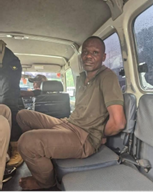Liberia’s Drug Abuse Crisis: Say No to Drugs

By Seltue Karweaye Sr.
On Thursday, August 7, 2025, Liberians from all walks of life will march together to express a united message: No to drugs. The “Say No to Drugs” campaign is more than just a rally; it is a powerful collective response to a national crisis that has persisted for far too long.
President Joseph Boakai on August 6, 2025, announced that the era of impunity for drug traffickers is over by unveiling a bold new Anti-Drug Action Plan. He stated, “Liberia will not lose another generation to drugs, not on my watch.” This announcement, made through an Executive Mansion release, comes amid growing public demand for action to address the country’s worsening drug crisis. The timing of the plan is significant, as it is revealed just one day before the large “Say No to Drugs” protest.
The new Anti-Drug Action Plan outlines a comprehensive approach that integrates law enforcement, education, public health, and legal reforms. Key provisions include mandatory performance evaluations for LDEA commanders, expedited processing of drug-related prosecutions, mandatory sentencing, asset seizure linked to drug trafficking, and expanded rehabilitation and reintegration services for recovering users.
The “Say No to Drugs” campaign coincides with the global observance of the 2025 International Day Against Drug Abuse on Thursday, June 26, 2025, with the theme “Breaking the Chains: Prevention, Treatment, and Recovery for All.” It underscores the urgent need for the government and stakeholders to work together effectively to combat the rising tide of drug abuse and illicit trafficking in Liberia.
First observed in 1989, the UN General Assembly’s resolution to commemorate June 26 each year underscores a global commitment to bolster action and foster cooperation aimed at establishing an international society free from the scourge of drug abuse. The UN has articulated, “From individuals grappling with substance use disorders to communities contending with the repercussions of drug trafficking and organized crime, the impact of drugs is both extensive and intricate.” Presently, the drug crisis has intensified, with illegal drug use surging worldwide. According to a comprehensive 2024 report by the United Nations Office on Drugs and Crime (UNODC), the number of individuals engaged in illicit drug consumption escalated dramatically from 240 million to 292 million over the past decade, highlighting alarming trends in global substance use. The report further reveals that the vast majority of users worldwide, totaling 228 million, primarily consume cannabis. Additionally, 60 million individuals are reported to use opioids, while 30 million engage with amphetamines. Cocaine use affects 23 million people, and 20 million individuals are reported to consume ecstasy.
In Liberia, the challenges posed by drug abuse and illicit drug trafficking are particularly severe. A report released by the Liberian Drug Enforcement Agency (LDEA) in February 2024 indicates that approximately one million of the nation’s five million residents struggle with addiction to various illicit substances. Once regarded as a marginal issue, drug abuse in Liberia has escalated to epidemic proportions, affecting both urban and rural communities alike. This troubling trend is manifesting in the increasing prevalence and consumption of addictive substances such as Kush, Tramadol, cannabis, methamphetamine, and a variety of other illicit drugs, highlighting a critical public health crisis that demands urgent attention and comprehensive intervention.
Religious leaders, social media influencers, celebrities, etc. have a significant influence on public perception and behavior, and as such, they should take on the responsibility of promoting positive values and advocating for a drug-free lifestyle. Their platforms can be powerful vehicles for change, inspiring young people to make healthier choices and understand the long-term consequences of drug use.
To effectively combat the drug crisis in Liberia, law enforcement agencies must implement more stringent measures against drug trafficking networks and unlicensed vendors. This includes not only increasing surveillance and community outreach but also enhancing collaboration with international partners to dismantle global trafficking operations. Stricter penalties should be enacted for drug traffickers, both domestically and internationally, to serve as a deterrent and emphasize the seriousness of these crimes.
We must commend the dedicated organizers of the “Say No to Drugs” march, an event that showcased the resilience and commitment of the Liberian people. Traditionally, Liberians have been hesitant to brave inclement weather, but on Thursday, August 7, 2025, they defied this norm. Despite heavy rains pouring down, thousands of citizens gathered in the streets, demonstrating their unwavering support for the urgent need to address the drug epidemic plaguing the nation.
This remarkable turnout not only highlighted the community’s concern but also sparked a profound awareness of the pervasive drug issue affecting countless families across Liberia. The courage displayed by these individuals served as a powerful motivator for me to write this article. It is clear that we, as a society, must come together to advocate for a drug-free Liberia. United in our efforts, we can truly make a difference and say a resounding “No” to drugs in our country.
Also, it is important to commend President Joseph Boakai for his courageous implementation of the Anti-Drug Action Plan, which lays the groundwork for addressing drug-related issues comprehensively. However, the Liberian government must go further by enacting robust policies that address the root causes of drug abuse, such as youth unemployment and limited access to mental healthcare services.
Investing in rehabilitation centers, particularly in rural communities, is crucial. These facilities should be adequately funded and expanded to provide comprehensive treatment and support to individuals struggling with addiction. Moreover, integrating education programs about drug prevention and mental health awareness within these centers can empower communities and foster a culture of support and recovery. Through these concerted efforts, we can create a healthier, drug-free environment for future generations. I rest my pen.



















